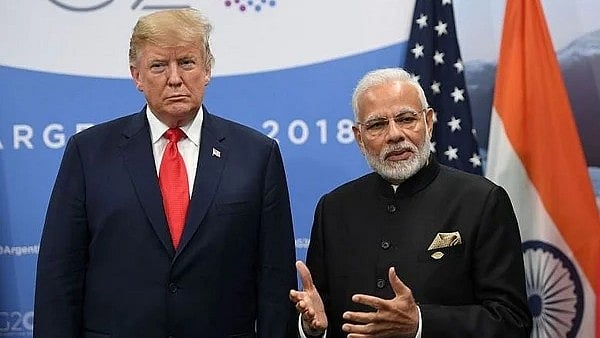Why Modi Avoids Trump
On a previous occasion, while addressing a rally in Odisha, he famously told the crowd that he preferred to spend time with the people of Odisha rather than attend a White House event with the US President. Behind such political theatre lies a serious diplomatic dilemma.

Why Modi Avoids Trump | File Pic
Prime Minister Narendra Modi’s decision not to attend the Association of Southeast Asian Nations (ASEAN) summit in Kuala Lumpur on account of Diwali-related engagements has raised eyebrows, though it has surprised few in the diplomatic circuit. The reason is not far to seek. His absence conveniently avoids an awkward meeting with US President Donald Trump, who is attending the summit. This is not the first time that Modi has chosen to sidestep Trump. On a previous occasion, while addressing a rally in Odisha, he famously told the crowd that he preferred to spend time with the people of Odisha rather than attend a White House event with the US President. Behind such political theatre lies a serious diplomatic dilemma.
Trump has been persistently embarrassing the Indian leadership with his off-the-cuff remarks and self-congratulatory claims. He recently declared that it was he who brokered the “peace” that ended Operation Sindoor—a brief four-day military confrontation in which the US played no direct role. More recently, he claimed that India had agreed, at his persuasion, to stop buying oil from Russia—a statement both inaccurate and diplomatically insensitive. Trump has also boasted that the stiff 50 per cent tariff the US imposed on Indian goods was part of a “negotiated understanding”, implying that New Delhi had somehow agreed to such punitive measures. Trump being Trump, there is no predicting what he might say after a bilateral meeting. His unpredictability is precisely what the Indian side wishes to avoid. Any offhand remark by him could undo months of careful diplomacy and trade negotiations. New Delhi, therefore, appears to have concluded that discretion is the better part of valour.
It is not as though India is uninterested in improving ties with the US. On the contrary, Indian and American officials have been engaged in steady discussions aimed at restoring normal trade relations. New Delhi has insisted that the talks progress logically and within a framework of mutual respect—not through political grandstanding or photo opportunities. Modi’s telephonic conversation with his Indonesian counterpart and the decision to send External Affairs Minister S. Jaishankar to represent India at the Summit demonstrate that the country remains fully committed to ASEAN and to multilateral engagement. For now, both sides seem to be signalling a willingness to turn the page. Trump’s recent Diwali call to Modi, described as “warm and productive”, has eased tensions somewhat. But if bilateral relations are to regain their former warmth, they must rest on maturity, not mutual manipulation. India and the US, as the world’s two largest democracies, owe it to themselves—and to the global community—to ensure that diplomacy prevails over ego and spectacle.
RECENT STORIES
-
-
-
-
-
